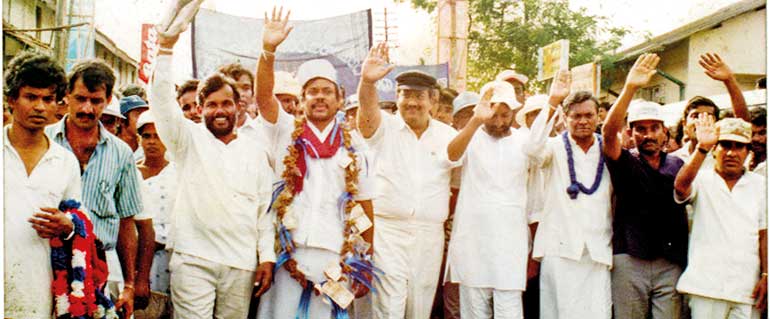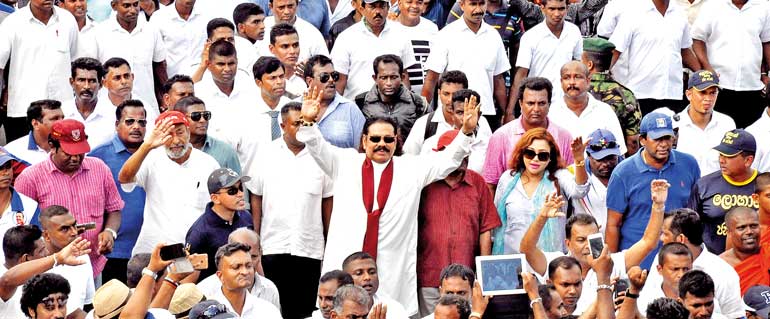Monday Feb 16, 2026
Monday Feb 16, 2026
Friday, 12 August 2016 00:04 - - {{hitsCtrl.values.hits}}

THE LONG MARCH – not so much a blast from the past, but a whimper from the world of wishful thinking? That the juggernaut which once swept everything in its path from Colombo to Kataragama (Pãda Yãthrã 1.0) – and beyond, to the killing-fields of Kilinochchi, and back – has run out of steam as well as significance was painfully evident to all but its participants. Still sorrier is the reality that champions of ‘transitional justice’ and campaigners against egregious governmental oppression have changed standards and are no longer flag-bearers for international intervention in national reconciliation – if they ever were…

Memory is a two-edged sword. For those who want to remember, it can be a blessing. For those who want to forget, a burden. Many human entities – as much as humanistic endeavours – have been doomed to remember what they can’t forget, and condemned to forget what they are desperate to remember.
Movements that seek to disturb the midnight’s sweet repose with memories from the troubled past are similarly double-edged  swords. They might exhume valuable bits of information and inspiration: the twin pillars which can be the building blocks of a future kingdom. And they could just as easily unearth skeletons from the privy cloisters of one’s painful but colourful political past, exposing how rotten the columns of one’s erstwhile political empire were…
swords. They might exhume valuable bits of information and inspiration: the twin pillars which can be the building blocks of a future kingdom. And they could just as easily unearth skeletons from the privy cloisters of one’s painful but colourful political past, exposing how rotten the columns of one’s erstwhile political empire were…
The machine that is – was? will be again? – the Rajapaksa movement plays dangerous games with the sunken memories of an island race. They are dangerous because these memories are not quite submerged or subsumed by a post-insurgency, post-insurrection, post-invasion, post-imperial national psyche. Therefore being not quite vanished from the greedy grasp of manipulative politicians, memories of 1956, 1983, 1997-1989, 2005-2014 are up for grabs for exploitation qua a return to some form or semblance of power by some factions or segments of ousted tyranny. They are dangerous because the racism endemic to our island-nation is still embedded in populist political monuments that cast a long shadow over our return to a still effete form or shape of democratic republicanism.
This reflection is both timely and post-mortem. The footfalls of our Long March – its second and more recent episode in post-independence history – have long ended. While the marchers – men, women, and a singular child among other naïfs and innocents – have trudged back home to hard-won bread for a few days after the circus of half-a-week, other more sinister elements are still out and about. Their cries and stains – hypocritical wails and crocodile tears – have been seen and heard in the House these days of debating bills about “transitional justice” (cited, but little understood). In the midst of these visible and tangible protests and over-protestation against ‘bringing up the bodies’ – some for fear the agency of the Office of Missing Persons may go too far, others that its instrumentality might not go far or far back enough – other trends and developments on the national political scene may well go unnoticed and uncommented upon, or noticed but still unmentioned.
JVP RIP
A firebrand political party of the past has been conspicuous by its lack of vociferous support for transitional justice. Even though it was this grassroots movement’s constituency in the South that was once, nay twice, decimated by both major political parties with which it has formed some sort of alliance during the past two decades. It is difficult to be publicly equally committed to antithetical positions when one is devoted to one’s political survival, growth, and potential future thriving – unless one is utterly hypocritical. Which the new JVP is not, one is led to believe. This running with the hare while hunting with the hound is realpolitik at its best. Or worst. Or a reluctantly admitted but realistically embraced strategy until a strengthened party renewed at its traditional sources can emerge as a real contender in the legislature. Feasibly within a decade or so when the native backlash against government’s uncritical internationalism could cost it in the hustings. In the hiatus, perhaps it can choose to strategically – if not afford to, electorally – forget its own holocausts at the hands of diverse governments.
UNP keeps mum
An even less transparent if more disingenuous strategy is that of the engine of the incumbent administration. No squeaky-clean powerhouse in the past, in its present avatar as the repository of Good Governance and the epitome of Good Global Citizen it has uncritically espoused the principles of transitional justice. But perhaps without the crucial embrace of its values in every sphere of its ambit or influence. While it excels at the vigorous exposition of the findings of sundry committees, its lacks a certain vim and vitality in putting the less salutary chambers of its own house in order. Leave VAT fiascos and alleged bond scams and other financially explosive misdemeanours and rumours of doings aside – would the UNFFGG expose its vested interests politically to the scrutiny of whatever mechanisms of transitional justice as do eventuate, ultimately?
Would, for instance, its prosecution of the war in the early 1990s or the 2001-04 period or the state’s crackdown on insurgency in the late 1980s be subject to its fair share of investigation? War is hell when others fight it; war is limbo in which we remember nothing when we have to further it for our own survival! A more recent moot point is if the administration with the reins of state agency in its hands is able – or willing – to prosecute egregious crimes against the state (and citizens) to the full extent of the law? Or cry safe for expediency’s sake… the charge that civil society commentators as much as the person in the street now feels justified in making, openly. More’s the pity if the charge that senior echelon politicos close ranks in the face of prosecutions that could bring the whole political edifice – some might say façade – down is true… Would that the exposé of Lasantha’s killing’s top-level commissioners, Ekneligoda’s abductors and orderers of abduction, and Thajudeen’s torturers, be brought to book! Or is it that the rot won’t stop with political foes, but go deeper and farther and inveigle those ‘our side’ has fielded to marshal ‘this party’ against ‘those onslaughts’ of nationalism?
SLFP split-rift
It is opportune for the UNP that its traditional rival is split in two by default, or (in another interpretation) bifurcated by design in one masterstroke of securing a common candidate and breaking an opponent in half. If not, putting off LG polls would be the least of its concerns. The SLFP in its full vitality might have been able to suggest that the rot goes deeper than the last stages of the war against terrorism as far as the mandate of transitional justice might go. Then it would have to hold its peace. There are dragons in its dens, too. Civil war is the least civil of humanity’s many depredations against its fellow citizens. It corrupts even the greenest of sea-green – or true-blue – republican leadership.
TNA DNA
Maybe the least said about the Tamil moderate political parties the better. There is no such thing as being moderately political in remembering wounds and hurts. Rather, choosing to be politically moderate in remembering rightly – in the overarching national interest, than in potentially pandering to one’s constituency for the sake of pragmatism over principle. But you can’t preach moderation to a people with bloodstains still fresh on their injured body politic. Just caution in striving to parity – or conflation in the popular (most dangerously, populism-inflamed) imagination, by dint of empathising too deeply with fellow-travellers who hands were once stained with blood. Transitional justice must not militate against national reconciliation. Only a moderate political party accused of sympathy for militant nationalism can relish the devilish irony of it.
Remembering right
The lives of great men / all remind us / we can make our lives sublime. / And when departing / leave behind us / footprints on the sands of time.
The issue is the men who would have us remember them and their movements are not all great, their lives and ideas not all sublime, and some of them certainly not departing.
We remember their later arrogance rather than early sterling youthful aggression against governments then gone wrong. We remember their recent guilt of the very grievances they once stood their ground against.
In remembering, we can’t forget their motives were vain; their methods mean; the measure of their movements tarnished forever because of their insistence on being seen or heard again: an afterlife for their progeny, a sort of immortality founded on false memories of heroism.
Nostalgia isn’t what it used to be.